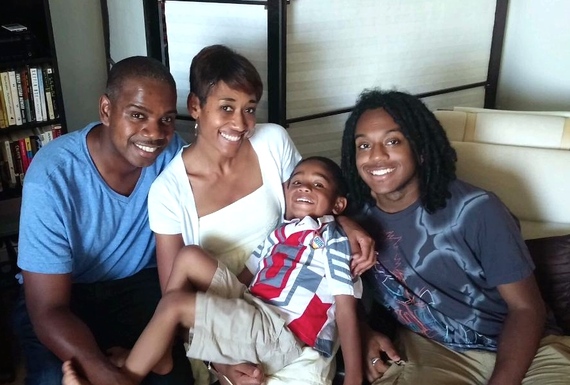By: Meilan Carter-Gilkey for mater mea
For the past five years I have been lying to my son.
Not intentionally lying, but not explicitly telling the truth. Our 5 year old Mateo has no idea that his 21-year-old brother is technically his half-brother. Kamau was 13 when I met my husband, David, and his relationship with his biological father was and still is non-existent.
When David and I got married and had Mateo, we began to look like a more traditional family--just one with a 16-year age gap between our kids. Strangers often teased that we were escaping empty nest syndrome by having another child so much later and I didn't correct them. It seemed useless telling someone I would never see again that Kamau was from a previous relationship, not a previous marriage. Telling people I wasn't married before has its own set of reactions so I mostly discuss it with people I know or if it's appropriate.
Maybe that's why I/we never told Mateo that Kamau has a different father--it never came up and it would confuse him. Mateo already struggles to grasp how life happened before him and he examines old pictures of Kamau and me always looking for himself, but interestingly he has not noticed that his father is also missing.
I never planned to not tell Mateo that he and Kamau had different fathers.
I grew up with stepparents and siblings who had different fathers, and there was no shame or confusion among us. But there were awkward and sometimes embarrassing moments when people tried to figure us out. My mother didn't sit me down to explain the family dynamics--I always knew. Kamau also grew up with diverse examples of family, including a community of single mothers.
Our current community of friends and classmates, however, happens to be almost exclusively two-parent heterosexual families. There are a few families that don't meet the nuclear family definition--single and adoptive parents--but their differences are not obvious to Mateo and he does not identify with them. Mateo knows he's different from many of his friends with siblings, though, and people always comment on our sons' age differences--will this eventually make him feel excluded? Discussing it with Mateo now feels forced and difficult. It's never the right time.
It also means reopening scarred wounds and answering a lot of questions to which I have no real answer. At 5, Mateo asks questions repeatedly if a concept is inconceivable or if an answer is abstract. I imagine him asking Kamau: "Why isn't Daddy your daddy? Where is your daddy? Why is he gone?" Although Kamau would understand his brother's confusion, it would still be a painful conversation to have.
I still feel the sting from countless moments of family, friends, and strangers inquiring or emphasizing the absence of Kamau's father. I heard everything from "Is it just the two of you?" to "You know a boy needs a father, right?" to "What did you do to chase his father way?" and worse. The blame put on me was infuriating and it salted the wounds we were trying to close. Kamau experienced his own awkward and invasive conversations and assumptions. One Halloween in particular stands out--a man passing out candy said, "Your dad must like your Spider-Man costume." Kamau's 3-year-old response: "My dad wasn't ready to be a dad."
Trying to find an answer, a rebuttal, or a reason to explain why a man abandons his child was painful and never-ending. I felt helpless. In my twenties, I focused on Kamau learning to navigate his pain, but as I got older I realized I had my own anger, shame, and feelings of abandonment--and subconsciously I blamed myself. While I am so thankful that Kamau came out of that union, I felt that I made a poor choice in being with someone who didn't care enough about his son or me to be a part of our lives. Maybe I don't want Mateo to see my shame.
Yet I also feel pride in raising a wonderful, loving, and intelligent child by myself. We were underdogs who proved that we didn't need his father. I held onto that pride, but getting married and having a father for Kamau was a fantasy realized. Mateo made our story complete and I'm scared to pop that bubble.
Like most lies, the truth has morphed into this distorted shadow that is much more frightening than actual fact. I imagine this heartbreaking scenario in which Mateo feels betrayed and questions Kamau and distances himself from him and from me. I worry Kamau will feel isolated as he did during my pregnancy--thinking David, Mateo, and I are a separate family. My anxiety spirals, but when I look at the love between our sons, I feel reassured.
We will have the conversation one day and Mateo may bring up it to us; whenever and however it happens, they will always be brothers and we will always be a family.
Meilan Carter-Gilkey is a freelance writer and a writing coach, who blogs about being a parent of sons 16 years apart. She has an MFA from Mills College in creative writing and her work has appeared in mater mea, Mutha Magazine, Heart&Soul, and elsewhere.
mater mea is a website that celebrates women of color at the intersection of career and family. Visit matermea.com for more great articles on work-life balance from a Black woman's perspective.
